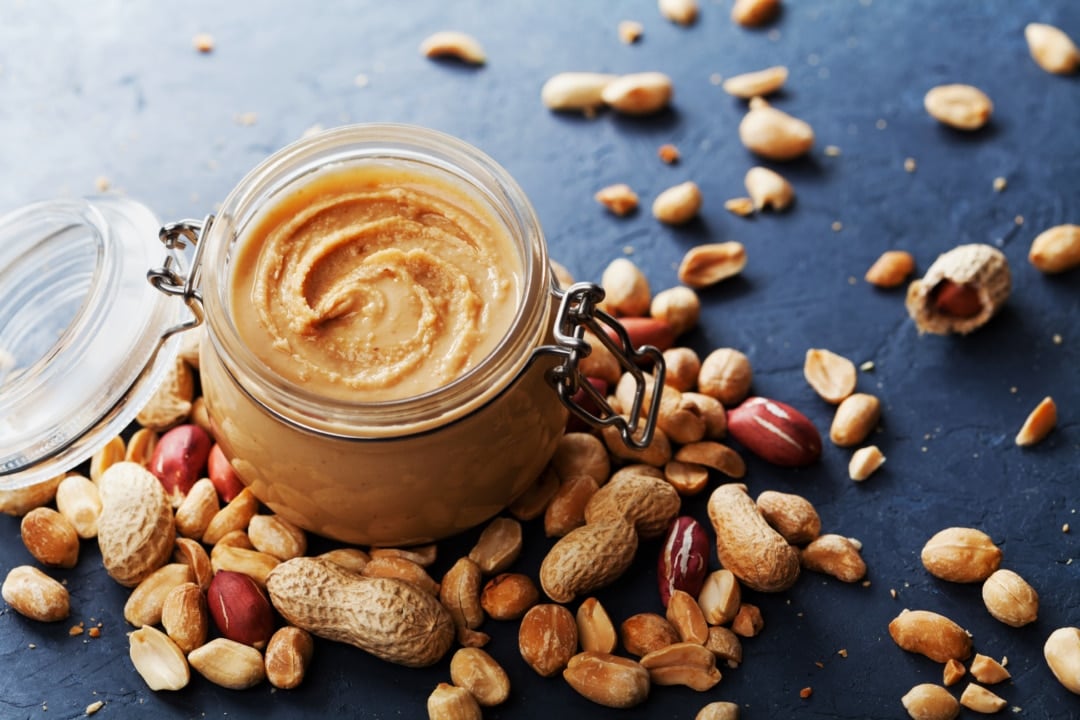5 Health Benefits of Peanuts + 5 Tips and Hacks

Get ready to take a deep dive into the world of peanuts. These tiny snacks are packed with benefits that could make a positive impact on your health. Stick around, we are about to reveal some crazy facts about peanuts and bust some myths along the way.
Do you want to hear some mind-blowing facts about peanuts? Apart from reducing the risk of heart disease, peanuts actually originate in South America. Just to shake things up a bit, peanuts aren’t really nuts. They’re legumes.
Interesting Facts about Peanuts

Interesting Facts about Peanuts
Peanuts are in the same family as beans, lentils, and soy. But don’t think about applying the five-second rule if you drop them; peanut allergies are real, and they can pack a punch worse than any bean you’ve met.
Despite the risk of allergic reactions, peanuts are still incredibly popular, thanks to their protein content. With their rich protein, vitamins, and minerals, peanuts are definitely worth including in your diet.
And you know what’s interesting? The fat content in peanuts can actually assist in weight maintenance. So don’t let those peanut kernels scare you away – they may just become your best assistant in maintaining that ideal waistline.
But be careful though, consuming peanuts in excess, or for those allergic, can lead to adverse effects as severe as aflatoxin poisoning and liver cancer. It’s always best to keep a balanced food intake to maintain your health and wellness.
Ingredients

Ingredients
Before we go any further, let’s talk about what you’re actually eating when you munch on a handful of peanuts. First of all, the main ingredient is, well, peanuts. Sounds obvious, huh? But there’s more to the story.
You see, when peanuts are eaten raw or roasted, their nutritional benefit can be simply amazing. We’re talking about an incredible concentration of protein, fat, and fiber. It’s casual.
You might be asking, 'Where does this amazing nutrition come from?' Here’s the secret: it’s all in the skin. This thin, papery layer is chock-full of antioxidants and other beneficial compounds.
Speaking of peanuts and their many forms, let’s not forget about our friend, peanut butter. This smooth and creamy spread, that’s a childhood favorite, is actually packed with the same nutritional punch. A worthy addition of peanuts to your diet indeed, if you ask us.
How Peanuts Grow

How Peanuts Grow
The process of growing peanuts is like cooking up your favorite grandma’s stew—it takes time, patience, and some good old mother nature’s TLC.
Well, peanuts are not exactly the typical tree fruits, nor are they true nuts. Peanuts, grow underground in pods, just like potatoes. You plant them early in the season when the soil starts warming up.
After a sunny greeting kiss, they break the surface with lush green leaves.
As they grow, the plants send out stems, called pegs, extending down and penetrating the soil. Once underground, the pegs evolve into peanut pods, the shell housing the precious peanuts that can be eaten.
They sit quietly beneath the surface, fattening up, and gathering the good stuff for about four to five months. So, when you’re munching on your nutty snack, remember, a lot goes into bringing those peanuts to your diet.
All peanuts ask for is a bit of sunshine, well-drained soil, and a hefty whack of patience.
Fun Fact
Even though we call them nuts, peanuts are more like peas because they’re legumes. So next time when you crack open a peanut shell, do remember the unique underground journey it went through to get to you.
Protein in Peanuts

Protein in Peanuts
Let’s talk protein, and let’s talk peanuts. Fighting against the common Joe, you could say peanuts pack one heck of a punch, protein-wise.
You see, these so-called ground nuts carry up to 22 to 30 percent of protein content per nut, aren’t that nuts? In leaner English, this means about 25.8 grams of protein in every 100 grams of peanuts.
Now, compare that to other snacks out there, and even some meats and peanuts are batting straight home runs, right?
Peanuts contain all 20 amino acids necessary for human health, where nine of which your body can’t produce on its own. What’s the big deal with these amino acids, you ask?
Well, they’re the building blocks of protein, that’s what they are. Adding peanuts to your protein shake or snack time isn’t just about bulking up those muscles either. It can aid in weight management, help to keep the hunger monsters at bay, and even strengthens your bones.
Myths about Peanuts
Right, let’s get into some myths about peanuts. There are all sorts of wacky ideas floating around about these humble nuts, but we’re going to clear it up, just like cleaning peanut shells off your grandma’s floor.
Eating Penauts Can Help Lose Weight

Eating Penauts Can Help Lose Weight
Firstly, a classic one—we’ve all heard it—eating peanuts can help you lose weight. While they do contain good fats and loads of fiber that can help fill your belly, let’s not mistake them for a weight loss secret weapon.
You see, peanuts are quite high in calories, so if you’re wolfing down bags of them like they’re going out of style, you might fit the bill for a human peanut yourself.
Peanuts Can Cause Appendicitis
Now, the next myth is a fun one. Some folks believe that peanuts can cause appendicitis due to their supposed tendency to get lodged in the appendix.
This is about as likely as finding a pearl in a cheeseburger. The fact is, peanuts – or any other food element – can’t run amok in your appendix.
Appendicitis is mostly caused by a blockage in the appendix lumen, leading to inflammation. Usually, the blockage results from hardened stool, not snack food debris.
Allergic to Peanuts – Allergic to All Type of Nuts

Allergic to Peanuts – Allergic to All Type of Nuts
Another tale folks spin about peanuts is the notion that people who are allergic to them are automatically allergic to all types of nuts.
This is as accurate as saying if you’re afraid of spiders, you’d be terrified of butterflies—after all, they both got too many legs, right? Peanuts are a legume, not true nuts, and an allergy to peanuts doesn’t necessarily translate to an allergy to tree nuts, like almonds or cashews.
However, it’s always smart to exercise caution and consult an allergist if you have a peanut allergy.
Peanut Oil Is Allergen-Free
Finally, here’s a curve ball—there’s this chatter about peanut oil being allergen-free. Now, while highly refined peanut oil is usually safe for those with peanut allergies, this doesn’t mean every peanut oil is allergen-free.
Unrefined or cold-pressed peanut oils may still carry the proteins that cause allergic reactions. So before you douse your salad with peanut oil in a fancy restaurant, it’s a good idea to check how it’s made.
Nutritional Facts and Calories of Peanuts

Nutritional Facts and Calories of Peanuts
Let’s start with the nutrition facts and see how these lil earthnuts are packing a heavyweight punch. Peanuts are rich in protein and packed with essential nutrients.
Good news for men and women alike, looking to maintain health and wellness. By devouring these kernels, you get to enjoy goodies like vitamins B1, B6, and B9 plus a sprinkle of vitamin C. Call it a nutritious buffet, if you like, because that’s exactly what it is.
Now, if we scratch beneath the surface, you’d also find a modest fat content. Don’t let that scare you, though, because it’s mostly oleic acid, a type of monounsaturated fat.
This kind of fat is the friendly kind that tames the wild cholesterol in your body without causing any adverse effects. Cut to the chase, less cholesterol means a reduced risk of heart disease.
Peanut consumption can also benefit your nervous system and your digestive system. The healthy vitamins and minerals in peanuts are not just empty words on a glossed-up nutrition label.
For instance, Vitamin B6 and the b vitamins are backers for your nervous system while the fiber in peanuts gently maneuvers their way through your digestive system, making everything run smoothly.
Health Benefits of Eating Peanuts

Health Benefits of Eating Peanuts
Now, peanuts are more than just a crunchy snack to munch on. They bring along a bag full of health benefits each with a potential positive impact on your overall health.
Whether it’s reducing the risk of heart disease or supporting healthier blood vessels, peanuts carry their weight quite meaningfully. With gifts like monounsaturated fats, omega-3 fatty acids, and resveratrol antioxidants, they boldly step into the realm of healthy eating.
The few who rarely ate nuts are truly missing out. Dive in, and let’s share more about these peanut benefits worth knowing.
Good Source of Fiber

Good Source of Fiber
Nothing screams "good source of fiber" like peanuts. Did you know these tiny shrubs pack as much dietary fiber as some whole grains?
That’s true. Nibbling on some peanuts can do you a world of good, helping to prevent constipation and promoting healthy weight loss in adults. Not just that, this fiber load contributes to enhancing your digestion and reducing the risk of type 2 diabetes.
Don’t just take my word for it. A study conducted by the National Peanut Board confirms that regular peanut consumption reduces the risk of type 2 diabetes.
More interesting is that this benefit is more significant in women. See, specifics are important. So, if you don’t feel like chasing a bag of mixed vegetables around the kitchen, you might go for peanuts.
They are similar to tree nuts on body weight benefits as they help maintain a healthy weight balance.
Helps Reduce Inflammation

Helps Reduce Inflammation
Ever woken up with an ache here and a sprain there? I know I have. Well, you may want to look into peanuts. Researchers highlight that peanuts possess anti-inflammatory properties.
Believe it or not, these humble legumes may help reduce inflammation in the body. Over a period, chronic inflammation can lead to multiple health complications, including heart diseases and even certain types of cancer.
And yes, you heard that right. Peanuts may have a reduced risk role in cancer-related inflammation. It’s like having a superhero snack right in your pantry.
Several studies have found a link between peanut intake and a reduced risk of developing several types of cancer. Specifically, peanuts, packed with plant compounds called isoflavones and phenolic acid, are known for their antioxidant properties, which are mighty useful in combating inflammation.
However, just like driving, moderation is key. Sure, peanuts may hail with multiple benefits, but binging on these pods does not guarantee a ticket to health-ville.
They’ve often been linked to aflatoxins, known for causing liver cancer. Balance, my friends, is your path to health and wellness. So, grab a handful and enjoy, but remember not to go overboard.
Improves Vision
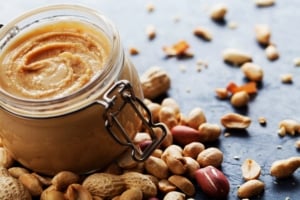
Improves Vision
Now, let’s talk business. Peanuts are mighty munchies, aren’t just delicious but they’re packed full of goodness that your peepers will appreciate.
They come loaded with zinc which is like a bodyguard for your eyes, handlin' business in the background. It’s there to send Vitamin A from the liver to your retinas to create the protective pigment that keeps your eyes healthy.
This little tango is what your eyes need to maintain clear vision. Far-sighted, near-sighted, or just plain old getting older – your eyes could use the leg-up.
But wait, there’s more. These little crunchies aren’t holding out on you, they also come stacked with vitamin E.
Well, peanuts to the rescue again. That vitamin E can put the brakes on age-related macular degeneration and cataract formation.
Improved Bone Health

Improved Bone Health
Nuttin' to see here, folks. Just more benefits jammed in these small packages called peanuts. Their nutritional profile is like a bone-building superhero, providing all the essentials to keep your body standing tall and sturdy.
Bone health isn’t just about calcium and milk mustaches. It’s an orchestra of different nutrients playing in harmony, and peanuts willingly toss their hat in the ring.
They are nutritionally dense and provide your skeleton a fighting chance against those daily wear and tear.
So whether you’re the "snap, crackle, pop" type when you get up in the morning or just want to keep the old infrastructure in good working order, consider adding peanuts to your diet.
But remember, folks, moderation is key. Too much of a good thing can sometimes come with its fair share of trouble.
Eating peanuts isn’t a golden ticket to bone health, but paired with a balanced diet, regular exercise, and good old fashioned common sense, it can support and maintain the health of your precious bones.
Sharper Brain

Sharper Brain
Did you know that just munching on a handful of peanuts can get your grey matter revved up? Yes, when you eat peanuts, your brain gets its fill of nutrients like vitamin B1, niacin, and folate that help keep it alert and sharp.
It’s sort of like adding premium gas to your old clunker. You might be surprised at how much better it performs.
And the benefits don’t stop there. These nutty bites are packed with niacin and vitamin B1 that are like superheroes battling the evils of age-related cognitive decline and diseases like Alzheimer’s.
Imagine these nutrients swooping down and restoring fire to the fading embers that your brain cells could sadly become.
Let’s not forget the magic ingredient in peanuts, the resveratrol, which teases out your cognitive abilities and verbal fluency, making you the life of every gathering.
Disadvantages and Potential Risks of Peanuts
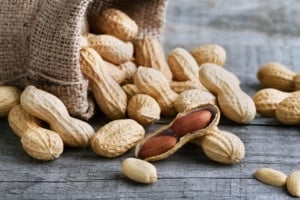
Disadvantages and Potential Risks of Peanuts
Like a flashy car with a few hidden hitches, peanuts, too, have their downsides. It’s essential to understand their potential risks while enjoying all that hearty goodness.
Mind you, with these nuts, it’s not just about how much you munch, but also about the kind of niacin from the food you consume and at what rate of cognitive decline you’re at.
Allergies

Allergies
Definitely, you enjoy your noshing on peanuts. But here’s the kicker – for some folks, peanuts are like monsters disguised as mighty meals. And what’s responsible for this?
Well, it all comes down to peanut proteins, categorized as albumins or globulins, accounting for 87 percent of the total protein. Sounds technical, right?
Now, on this protein surface, there are two major proteins, arachin, and conarachin, acting like tripwires setting off an allergy. The ugliness of an allergic reaction?
It can manifest in various ways – from a runny nose to a full-throttled anaphylactic reaction. And the cause still remains unknown, kind of like a twist in a mystery novel you haven’t solved yet.
Diarrhea
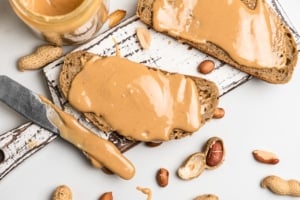
Diarrhea
Here’s the scoop. While peanuts are an awesome source of protein and healthy oils, they can be a bit harsh on the digestive system. Some folks report experiencing diarrhea after eating peanuts, and this isn’t just some urban legend.
You can liken it to a greased-up kid sliding down a water slide, just too fast for comfort.
A medical study from the International Foundation for Gastrointestinal Disorders confirms that too many peanuts can indeed lead to poop problems.
So, what’s the culprit behind this? Lectin, a protein found in peanuts, could be stirring up the trouble. Johns Hopkins University found this substance can affect your intestines if you have a sensitive stomach or eat large amounts of peanuts.
Swelling of Face
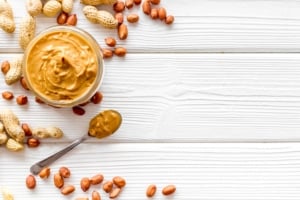
Swelling of Face
Imagine waking up one day and looking in the mirror only to find you’ve got a mug like a blowfish. That’s some scary stuff.
While it might sound like a scene from a B-grade horror movie, it’s a real symptom of peanut allergy that some people, unfortunately, experience – swelling of the face.
As explained by the American College of Allergy, Asthma & Immunology, consuming peanuts can trigger an allergic reaction that leads to facial swelling, also known as angioedema.
Symptoms can vary from mild puffiness around the eyes to more dramatic swelling.
Are Peanuts Good for You in Pregnancy?

Are Peanuts Good for You in Pregnancy?
Many pregnant women grapple with the peanuts or no peanuts question. Well, as per the American Pregnancy Association, peanuts could actually be beneficial during pregnancy. Here’s the deal.
Peanuts are well-stocked with healthy proteins and folic acid, vital for the development of the baby’s neural tube.
Also, contrary to popular belief, munching on peanuts during pregnancy doesn’t necessarily increase your little one’s risk of developing a peanut allergy. However, moderation is key.
It’s like adding salt to your soup. You don’t want to get heavy-handed and ruin a good thing.
Can Dogs and Cats Have Peanuts?

Can Dogs and Cats Have Peanuts?
Budding pet owners often wonder whether their furry friends can join in the peanut-snacking fun. While peanuts are not toxic to dogs and cats, the ASPCA warns owners to tread carefully.
Sure, peanuts are packed with protein and healthy fats, but they’re also high in fat and calorie content, and could lead to weight gain. Imagine your pooch looking more like a barrel than a dog.
Better to play it safe and limit peanut treats to the occasional snack.
Other Ways to Consume Peanuts

Other Ways to Consume Peanuts
Hold on, you don’t just have to munch on raw or boiled peanuts all day. Yes, you heard me right. Try adding a handful of these tasty legumes to your evening salad or breakfast cereal.
Maybe even treat yourself with some crunchy peanuts sprinkled over a bowl of frozen yogurt.
It’s not just about munching on these nibblers – peanut oil and peanut butter are some super tasty and super healthy ways to sneak them into your meals.
Moderation is key, so stick around 1-1.5 ounces each day.
Peanut Oil

Peanut Oil
Are you tired of your salad dressing or just looking for a change? Then, peanut oil comes to the rescue. Peanut oil, extracted from these mild-tasting legumes, is commonly used in our diets, and let me tell you, it packs quite a nutritional punch.
Whether it’s used for frying or as a topping on your salad, peanut oil is one fantastic way to add flavor while reaping nutritional benefits.
Keep it in your kitchen and you’ve got yourself a secret ingredient that can turn any dull dish into a delectable delight.
Peanut Butter

Peanut Butter
Now, what’s more, satisfying than eating peanut butter straight from the jar? Don’t give me that look. We’ve all done it once, right?
Peanut butter is a timeless favorite that complements a myriad of snacks.
Whether it’s used as stuffing for your homemade chocolates, or simply licked off the spoon during your midnight cravings: Peanut butter is hands down a versatile and delicious way to enjoy peanuts.
Keep things interesting and add peanut butter to your breakfast routine or snack time, you’re gonna love it.
Tips and Hacks on Peanuts
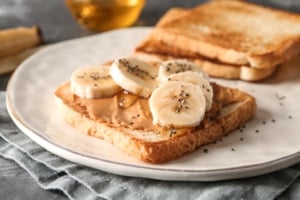
Tips and Hacks on Peanuts
There are countless ways to enjoy peanuts and believe me, it’s not just about eating them raw or boiled. From roasting to frying, from peanut butter to powdered form, the options are endless.
And you know the skin, the thin papery stuff you often throw away? Well, it turns out it’s a treasure trove of antioxidants and phytochemicals, too.
So the next time you enjoy your peanuts, why not try them with their skin?
Honey Roasted Peanuts

Honey Roasted Peanuts
Grab yourself 1 pound of raw peanuts, 2 tablespoons of butter, 1/3 cup of honey, ¼ teaspoon of cinnamon, 1 teaspoon of vanilla extract, 2 teaspoons of salt, and ¼ cup of granulated sugar.
I know it’s quite a list, but when you taste the finished product, you’ll know it’s worth it. Follow the recipe, ensuring you’ve got even layers on the baking sheet. Once they’re golden brown and cool, store these sweet little morsels in an airtight container. You’ll be glad you did.
Best Way to Make Your Peanut Oil

Best Way to Make Your Peanut Oil
Experimenting in the kitchen is fun, huh? So let’s play around with boiled peanuts to make our very own homemade peanut oil.
Regular peanut oil is great, but oil made from boiled peanuts introduces a unique flavor that’s undeniably delicious.
Now, creating your own peanut oil might seem a bit daunting, but believe me, it’s not rocket science. Do a little research, find a recipe that suits you, and go for it.
Remember, homemade is all about control over quality and taste, so let’s make the most out of those peanuts.
Best Way to Eat Peanuts

Best Way to Eat Peanuts
Let’s let the cat out of the bag here. The best way to eat peanuts is to boil them. Yes, you heard that right. Boiled peanuts not only jazz up the taste parade but also boost the antioxidant game.
Straight out of their shells and into hot boiling water and, voila. Savor that unique, soft, flavored munchies that give a royal wallop to the cravings.
Noshing boiled peanuts will keep you clear of that dunce cap-like toxin, aflatoxin.
Now, you might be tempted to add a wee bit of sugar but the secret recipe would be limiting the added sugar, championing the natural, nutty taste.
Peanut Storage

Peanut Storage
No matter how you spin it, peanuts are a treat. The little problem is their touchiness to storage. The ticket to perfect peanut storage is keeping them in a cool, dry place.
That magic trick stretches out the shelf life like a piece of gum. If your heart is set on raw or boiled peanuts, remember freshness is the real MVP.
However, those dry-roasted, salted soldiers can brave a few months if you keep them locked up tight in a cool, dry bunker.
Buying Quality Peanuts
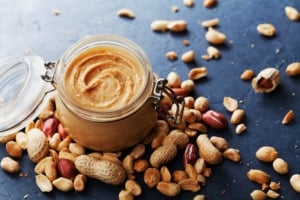
Buying Quality Peanuts
So you want to make peanut sauce? The secret is in the peanuts you select. You need to keep your peepers open for quality peanuts. Buying them is another kettle of fish altogether.
Consumption of peanuts and peanut butter can be quite a booster for your immune system, but make sure you’re buying right. Look out for Spanish peanuts if you can, they’re usually a hit.
For your daily intake, always check the packaging, and opt for unsalted, protein-packed peanuts, without added sugars. Variety in the consumption of peanuts and peanut butter can make a world of difference to your daily intake.
- Tomato Juice. Health Benefits + Tips.
- Asparagus. Benefits for Your Health.
- Mango. Benefits and Side Effects.
- Onions. Health Benefits and Tips for Use.
- Spinach. Benefits and Exctiting Facts.
